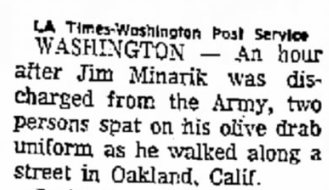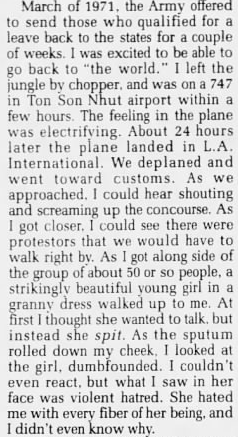Lembcke has published a number of articles asserting many times that this is a myth, so it is probably helpful to cite another writer on the same subject. Bob Greene, in his book Homecoming (1989), collected many anecdotes of supposed spitting incidents, solicited through a national newspaper column. However, he collected just as many letters from Vietnam veterans insisting that such anecdotes were false and created after the fact for reasons that all veterans knew.
Why were such anecdotes popular, and do they appropriately characterize what happened when Vietnam veterans came home? Here is how one historian characterizes the real situation in 1969-73:
Eric T. Dean Jr. "The Myth of the Troubled and Scorned Vietnam Veteran." Journal of American Studies, Vol. 26, No. 1 (Apr., 1992), pp. 59-74
During the height of American participation in the Vietnam War in the
1960s, most accounts of the Vietnam veteran returning from the war zone
presented him as readjusting quite well to civilian life. The New York
Times noted in 1968 that returning servicemen were finding jobs faster
than at any time in the past 10 years... The first American troops to be withdrawn from Vietnam (in 1969) were greeted by a parade in Seattle at which the crowd
yelled "Thank you! Thank you!" and "flags waved, ticker tape showered down on the troopers, and pretty girls pressed red roses into the men's
hands."
Despite these warm welcomes, Dean describes that a story of Vietnam veterans as "forgotten" set in very quickly around 1971-73. For example, heroin use by soldiers was seen to indicate despair, although nearly all quit using heroin upon return to the US. This is when most stories of spitting seem to be dated to after the fact, but again, historians including Lembcke, Dean, and others tell us that it was exceedingly rare to find such reports in period archival material, which makes it hard to judge how many such incidents really took place.
Dean links the idea of the forgotten, unwanted veteran in need to larger national narratives in which the war itself was seen as unwanted. Many veterans publicly confessed to My Lai-like incidents to provide their assent to a narrative of unwanted war with unwanted veterans. Such a narrative demanded national political response, and Dean continues:
[A] national obsession to "welcome home" the Vietvet
developed in the late 1970s, and manifested itself primarily in various
declarations, lavish parades for the Vietnam veterans, and the construction
of the Monument to the Vietnam War Dead in Washington, D.C.
President Carter followed the example of Presidents Nixon and Ford of
honoring the Vietvets by declaring a Vietnam Veterans Week. In
addition, Veterans' Day on 11 November 1979, was dedicated to the
Vietnam veterans, and Congress declared 26 April 1981 to be "Vietnam
Veteran Recognition Day."
On 7 May 1985, 25,000 Vietnam veterans marched in a New York City
ticker-tape parade attended by one million people, many of whom held
signs saying: "You're Our Heroes, Vietnam Vets."26 Similar parades
followed in Chicago, Houston, and elsewhere. An oddity associated with
these repeated welcomes and parades was that with each new one, some
veteran would inevitably be quoted as saying that the Vietnam veterans
had never received such recognition before and were "finally being
welcomed home."
Dean has also written a book, Shook Over Hell (1997), which aims to demonstrate through comparison of primary sources that Vietnam veterans actually had a much warmer welcome and treatment than Civil War or WW2 veterans.
Dean and Lembcke are in agreement that soldiers received a warm welcome. They provide only slightly differing accounts of how the myth of being spat on developed, with Dean attributing it to the narrative of the war being unwinnable, and Lembcke more specifically citing right wing commentators' belief in a stab-in-the-back story of "betrayal at home" (a common myth which continues to be repeated by sources like PragerU on YouTube).
Other historians have considered different angles. Myra MacPherson, in Long Time Passing: Vietnam and the Haunted Generation (1984), considered the inability of Vietnam veterans to live up to the heroic story of their fathers' experiences in World War II. Tracy Karner, in her article "Fathers, Sons, and Vietnam" (American Studies 37.1, 1996), analyzes this from a slightly different angle, proposing that the veterans' own self-identity as men was wounded by this inability to live up to the heroic WW2 narrative, and that this often manifested itself in a new narrative of loneliness, meaninglessness, and attempts to prove oneself with dangerous activities and drinking. In fact, this article by Karner is one of the earliest uses of the phrase "toxic masculinity".
These accounts are all basically handling essentially the same issue of veterans' experiences and memories failing to find a place in the national narrative of an unwinnable or betrayed war, as opposed to the veterans being literally welcomed home and thanked by their communities upon return from Vietnam. It is hard to prove that no returning veteran was ever once spat on, but the narrative that such anecdotes attempt to reinforce is definitely false and has always been false.


